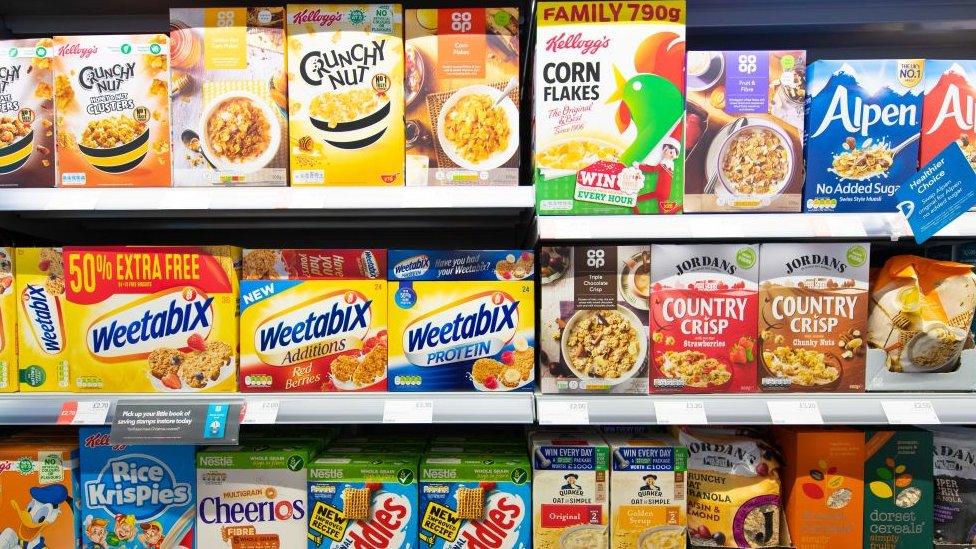Kellogg's in court battle over new rules for high-sugar cereals
- Published
- comments

Food giant Kellogg's is taking the government to court over new rules that would prevent some cereals being prominently displayed in stores because of their high sugar content.
Kellogg's says the rules fail to consider the nutritional value of the milk added to the product.
The company says independent market data shows cereals are eaten with milk or yoghurt in 92% of cases.
But the government said the new rules would help tackle childhood obesity.
Under the new regulations for England, external, which come into force from October, retailer promotions on food and drink high in fat, salt or sugar will be restricted.
Products covered by the restrictions will also not be allowed to be featured in key locations such as checkouts, store entrances, aisle ends and their online equivalents.
Popular brands such as Crunchy Nut Corn Flakes and Fruit and Fibre are classified as foods that are high in fat, sugar or salt in their dry form and so retailers may be prevented from displaying such products in prominent positions, harming sales.
Including added milk would change the calculation by reducing the proportion of sugar and salt content relative to the weight of the overall serving.
In a statement, Kellogg's said it had "tried to have a reasonable conversation with government" over the issue without success - hence their legal challenge.
Chris Silcock, Kellogg's UK Managing Director, said: "We believe the formula being used by the government to measure the nutritional value of breakfast cereals is wrong and not implemented legally. It measures cereals dry when they are almost always eaten with milk.
"All of this matters because, unless you take account of the nutritional elements added when cereal is eaten with milk, the full nutritional value of the meal is not measured."
However, some food campaigners disagreed.
Caroline Cerny, from the Obesity Health Alliance, said: "This is a blatant attempt by a multinational food company to wriggle out of vital new regulations that will limit their ability to profit from marketing their unhealthy products.
"It's shocking that a company like Kellogg's would sue the government over its plans to help people be healthier rather than investing in removing sugar from their cereals."
A Department of Health and Social Care spokesperson said: "Breakfast cereals contribute 7% - a significant amount - to the average daily free sugar intakes of children.
"Restricting the promotion and advertising of less healthy foods is an important part of the cross-government strategy to halve childhood obesity by 2030, prevent harmful diseases and improve healthy life expectancy, so we can continue to level up health across the nation."
The BBC understands the government is determined to fight Kellogg's legal case as it might allow other producers to suggest ways their products' fat, sugar and salt content could be reduced if served with other ingredients, in a way it feels could undermine the new regulations.
A hearing on the issue begins later at the Royal Courts of Justice in London.
Related topics
- Published25 July 2020
- Published24 June 2021

- Published7 October 2020
